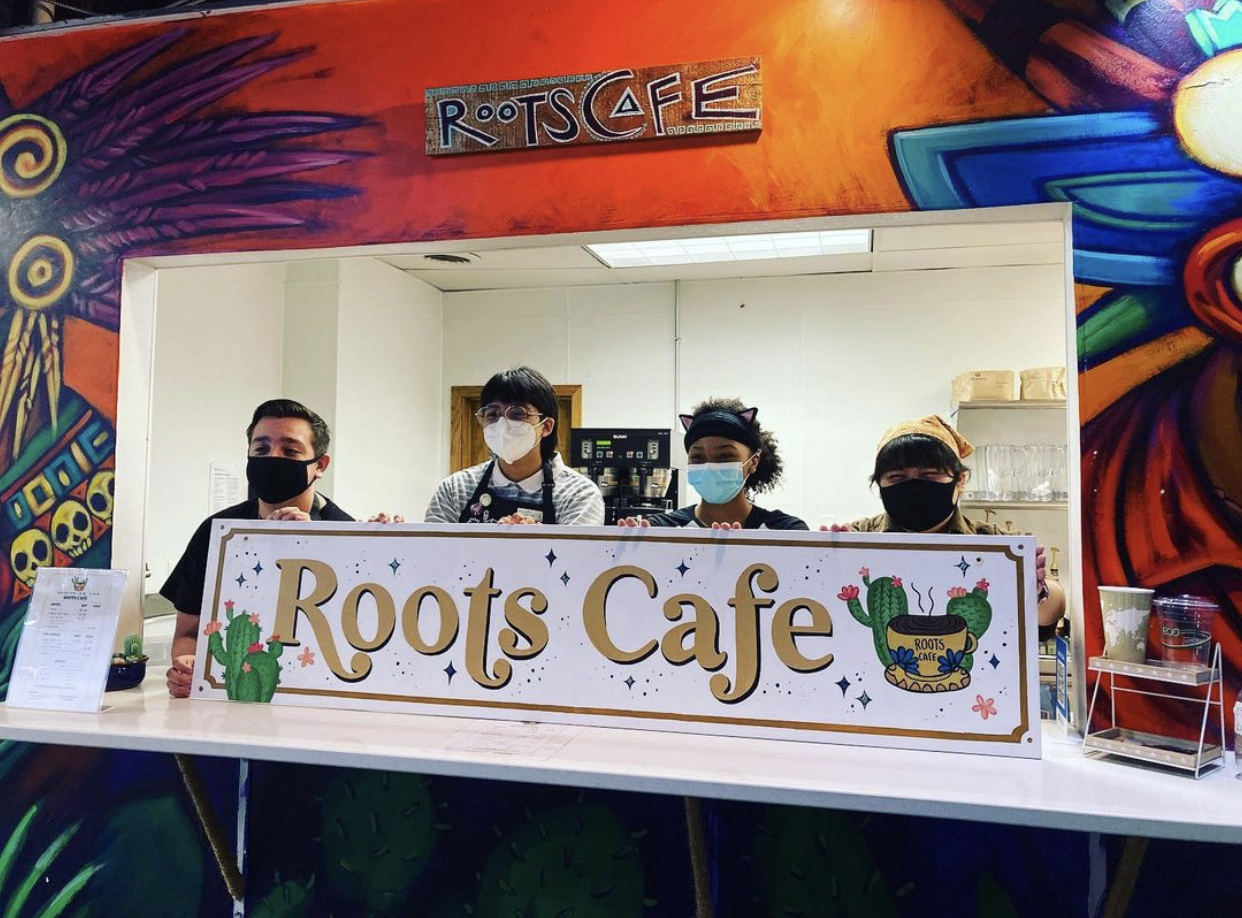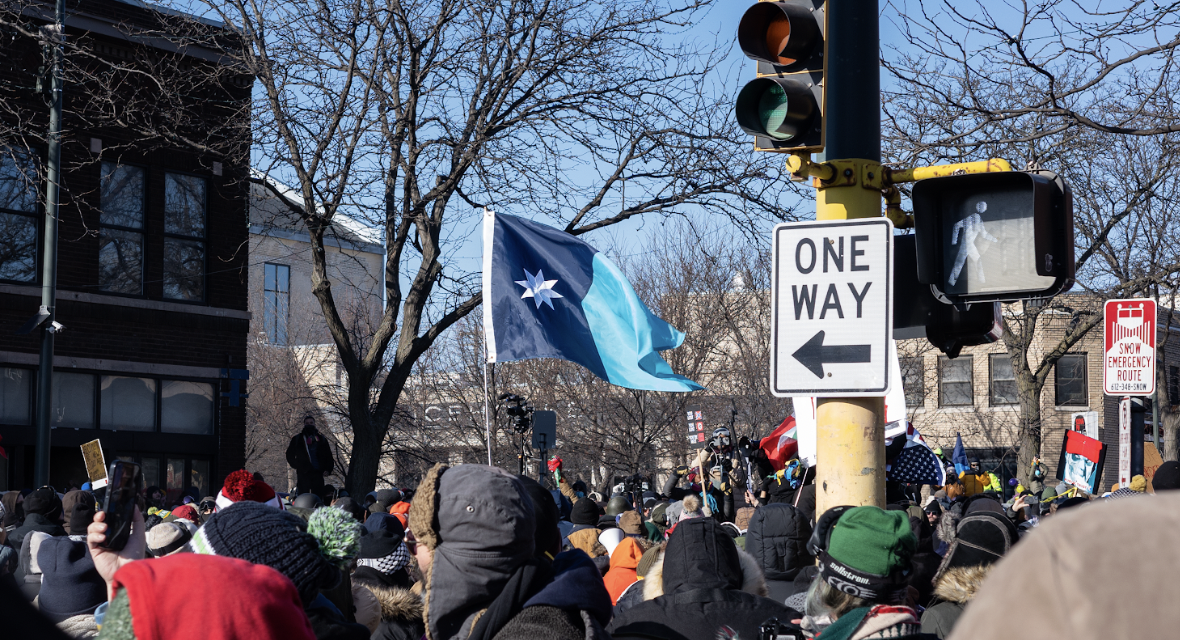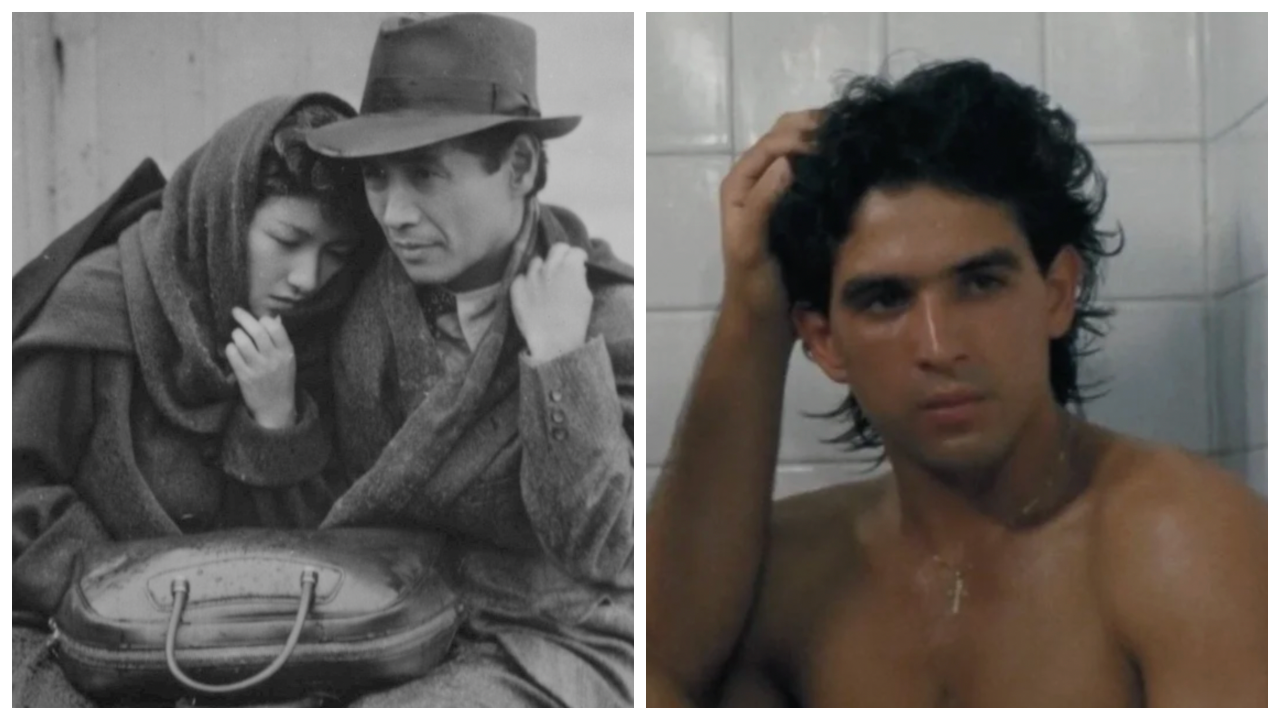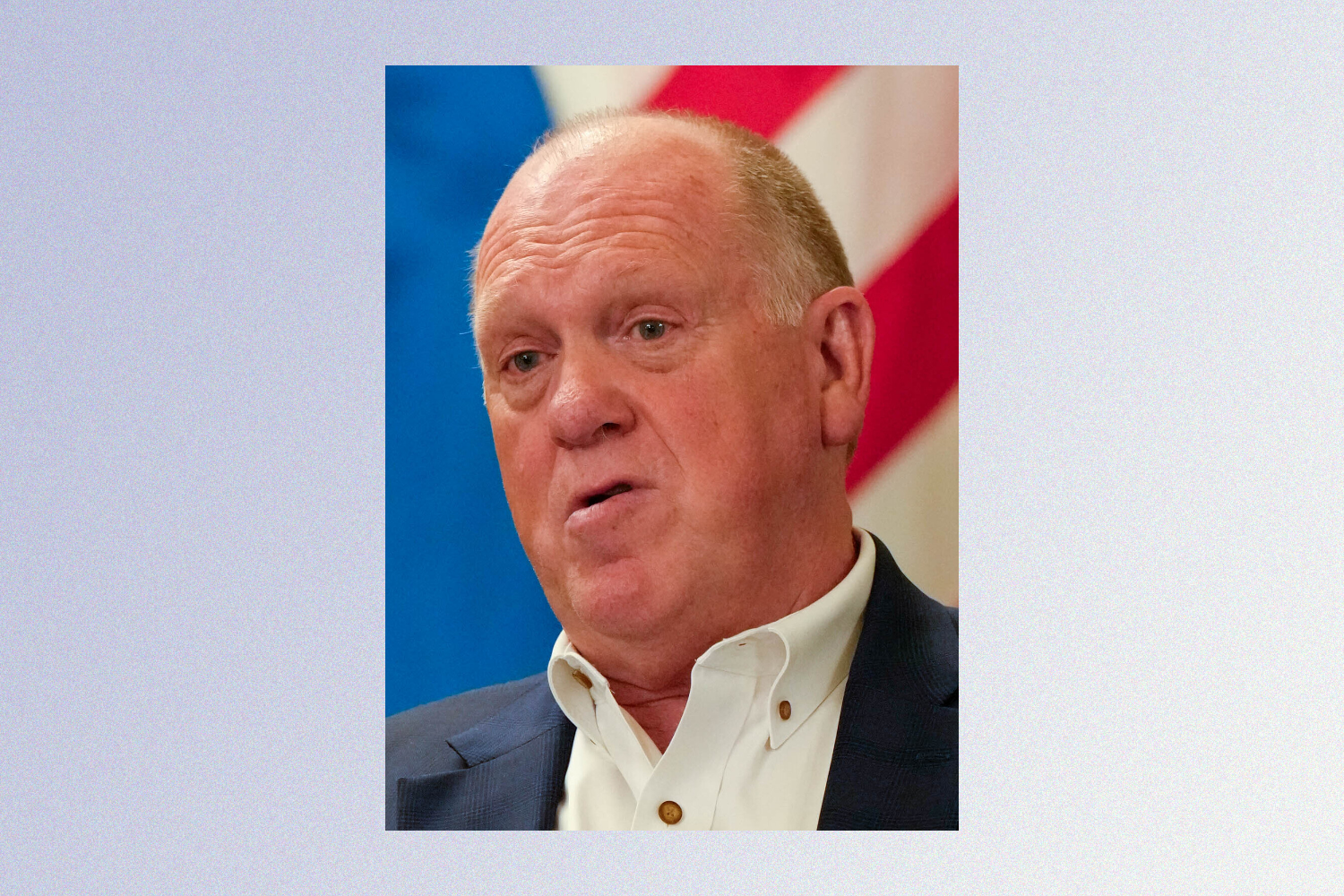Abogados Café opened in June, billing itself as the first Latina-owned coffee shop in the Twin Cities. And yes, that seemed impossible to Ofelia Ponce and Inti Martínez-Alemán too.
“It’s very unbelievable to us,” says Martínez-Alemán. “Coffee is originally from Ethiopia, and Yemen, but Latin America made it famous a century ago.”
The husband-wife duo were lawyers in their native Honduras, a country known for its robust and full-bodied coffee beans. At Abogados in St. Paul's Como Park neighborhood, they’re combining their love of law, coffee, and Latin American culture in the same building as Ceiba Fôrte, Inti’s law firm.
“We really wanted something that stays true to who we are,” Ponce says. “Our focus is only specialty Latin American coffee—we have coffee from Mexico, Honduras, Colombia, and Peru.”
The coffee industry’s issues with race can be traced back to its origins. Many historians believe slaves brought coffee cherries for food while they were being trafficked to the southern Arabian Peninsula. Today, beans are almost entirely grown and harvested by Black and Brown hands in Latin America and Africa, but in the U.S., at least 70% of roasters are white.
“What you don’t see nearly enough of is people of color in coffee, period,” says CJ Porter Born, director of coffee at the Get Down Coffee Co. “Not just business owners, but also, look at most cafes. Most cafes are almost all white.” A space like The Get Down, a Black-owned, Black-led coffee shop that opened in north Minneapolis in November, is a true rarity, both here in Minnesota and around the country.
But pay attention, and you’ll see that’s starting to shift. “Black entrepreneurs are taking back the industry their ancestors started,” MIC reported in October, followed by a March story in Fast Company: “A wave of Black-owned brands are working to reclaim the Black birthright of coffee.”
In the Twin Cities, at least six coffee shops owned by people of color have opened already this year. Forreal Coffeehouse, a real estate and coffee startup, opened in George Floyd Square this March. In downtown Minneapolis, there’s Mocha Momma’s, which opened inside Central Library in June. Roots Cafe is now up and running in St. Paul’s Indigenous Roots Cultural Arts Center; Indigenous-owned Makwa Coffee just opened in Roseville; and Flava Cafe, which creates opportunities for young women of color and gender expansive youth, just landed in St. Paul.
The small surge in BIPOC-owned coffee shops has been heartening for these new business owners to see. Now, their hope is that this will be the start of an ongoing movement throughout Minnesota.
“You go anywhere else, and there’s Latino-owned coffee shops, you know?” Martínez-Alemán says with a chuckle. “Not here, unfortunately.”
Coffee is supposed to bring people together. Cafes are where people gather, for work or to relax with a book and make small talk or to meet an old friend; coffee and community go hand-in-hand in coffee shop branding.
Growing up mixed in St. Paul, Porter Born remembers feeling “too white for the Black kids, too Black for the white kids.” Coffee was the thing that gave him a sense of belonging, “or at the very least, I didn’t actively feel like I didn’t belong there,” he says. Sitting on a patio with a latte, having conversations with regulars—those were the days that ignited his lifelong love for coffee, eventually leading him to a decade-long career in roasting and his role as The Get Down Coffee Co.’s director of coffee.
“I think even as a kid, I was fascinated by what made the coffee shop environment possible, and how one seemingly insignificant beverage brought so many people together every single day,” he says.
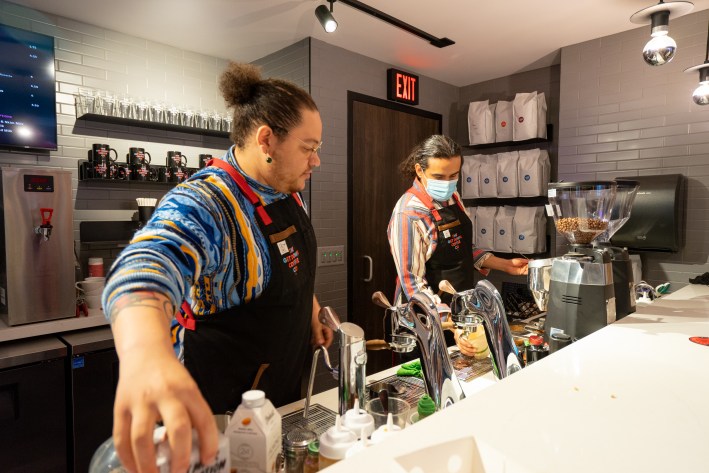
On the other hand, “It’s not an easy industry,” says Melanie Leehy, whose coffee shop Mocha Momma’s opened in June. The cafe has been a vision of hers since 1990, when she launched the nonprofit MARCH—Mobilizing and Releasing Caring Hearts—and started doing street outreach with youth in Uptown. (March is also her middle name.)
For decades, when she told people she wanted to open a shop of her own—specifically, one that would be a gathering space where urban youth would get mentorship through coffee—she’d hear a version of the same thing in reply: “Why do you want to open a coffeehouse? There are already coffeehouses in Minnesota, in the Twin Cities.”
“It is drastically more difficult to do anything as an African American,” Leehy says. “As an African-American woman, it’s that much harder. And no one understands that journey, unless they’re an African American.”
It’s not just the financial and economic barriers that make it challenging, though Minnesota does have the third-largest racial wealth gap in the U.S. There’s also the issue of education, of who has access to information. Unlike local beer, where breweries openly collaborate and it’s not uncommon to see a bartender at one brewery wearing a shirt from another, or dining, where pop-ups often bring chefs from different restaurants together, Porter Born says coffee tends to be more siloed, more secretive.
When he was getting his start as a young coffee roaster, for example, he remembers sending out dozens of messages to local roasters to see if he could spend any time with them to get an understanding of their trade. The result? “Virtually every one of them ignored me or told me no.”
Then there’s the fact that coffee shops are mostly run by white people, employ white people, and serve white people. There’s… I don’t know, John Mayer or something playing softly over the speakers. They feel white.
At The Get Down, “We want to make a specialty coffee experience that feels very Black, from the vibes to the music—the whole experience,” Porter Born says. “Even the ingredients we use, we go with sweet potato instead of pumpkin. And there’s a very specific reason for that: We’re trying to be the antithesis of pumpkin spice.”
Porter Born is also doing his best to combat the information gatekeeping that’s so prevalent in coffee. “Being one of the only roasters of color that I can think of in the Twin Cities… I feel like I have a responsibility to try to do as much of that stuff to blaze a trail,” he says. He has an open-door policy at The Get Down; he’s happy to answer questions big and small. Because without sharing that knowledge, and without holding the door open and cheerleading for others, the issues of inequality in coffee will persist.
“There’s always going to be the naysayers,” Leehy says. “As a person of color, I’ve had to choose to be a person of hope. If we let go of hope, if we let go of vision, we perish.”
Jamie Becker-Finn’s reasoning for opening a coffee shop was simple enough: In her Roseville community, there just wasn’t one within walking distance. So the Ojibwe state representative (DFL-42B) took matters into her own hands, opening Makwa Coffee in mid-July.
The last three weeks have been incredibly busy—“more than I had prepared for or would ever have guessed would happen,” she laughs. People have been seeing the shop on the news, and visiting from all over to try a Ziigwan cold brew sweetened with maple syrup or an Aurora & Chill, which combines green tea, blueberry syrup, and lemonade.
Mostly, these three weeks have been great. But there have been some uncomfortable interactions—for example, the white woman who walked in, took a look around, and then stepped up to the counter and said, “I thought this place was supposed to be Native-themed?”
“Yeah,” Becker-Finn says. “Ouch.”
It’s not the first time she’s had to respond to some version of “I thought it would be more Native in here.” More than once, she’s calmly explained that it’s not a “theme”—that yes, she’s an Ojibwe woman and her family is Bear Clan, but “No, there’s no dream catchers hanging over the espresso machine, that wasn’t the point,” she sighs. “That’s been sort of interesting, in the Minnesota way of using the word.”
That’s been the tricky thing about being one of the only Native-owned coffee shops in the area—most people have been supportive, and the interactions have been, on the whole, quite positive. But some people just don’t know how to act.
“The reality is that our state is different from the stereotypes from 30 years ago,” she says. “There are more BIPOC folks living here; there are more BIPOC business owners. Native folks live everywhere, not just in Minneapolis and on the rez. We live everywhere, and we don’t look like the stereotype.”
Like CJ Porter Born at The Get Down, coffee shops like Mawka and Roots Cafe are helping to bust those stereotypes and diversify the industry by training a new generation of baristas. Located in the Indigenous Roots Cultural Arts Center, Roots Cafe is operated by a team of local youth, who developed the menu, designed the space, and even make the herbal tea blends in house. (You can see their profiles on the Indigenous Roots Instagram.)
“Our main goal was basically being able to provide youth a place to get that job experience while having a fun internship where they feel safe, and they get to have a say in what they’re creating,” says cafe manager Reyna Day. They wanted their workers to think beyond the register, asking: “What is it to be a barista? What is it to sell coffee—and how can it be more than just a transaction, but a lifelong experience?”
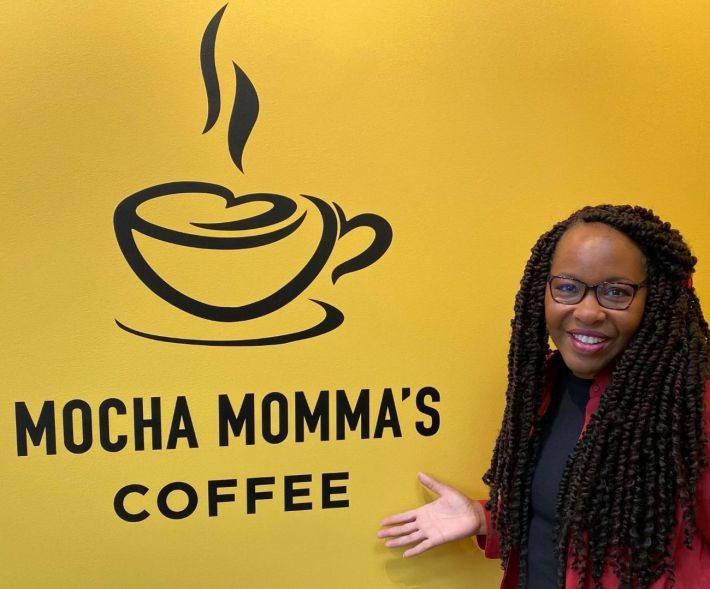
That’s part of the mission at the brand-new Flava Café, too, which “eliminates disparities for young women of color and gender expansive youth one latte at a time,” and at Mocha Momma’s, where soon Leehy will launch a barista training program aimed at Black youth from the community.
“With coffee, you are also learning a craft,” she explains. “But you also have to have excellent customer-service skills. Being able to do those all at the same time is an interesting combination—can you pull a shot and have a conversation without stopping to pull that shot? It’s creative, and it’s community.”
With a new generation of business owners giving a new generation of youth the tools they need to succeed through coffee, it’s conceivable that given enough time, we could reverse some of the racism and whitewashing so inherent to the industry. Maybe cafes can truly become a place for everyone to connect.
“There’s enough—it’s a microcosm of what I talk about in my political work,” Becker-Finn says. “There is enough to go around. It isn’t a zero sum game where somebody doing better means somebody else has to be harmed. I think that’s the perspective a lot of us who maybe don’t look like the owner of Starbucks might bring to the table.”
If You Visit…
Abogados Café
1053 Dale St. N., #102, St. Paul
Monday - Friday: 7 a.m. - 1 p.m.
Saturday: 8 a.m. - 1 p.m.
Mocha Momma’s
300 Nicollet Mall
Monday - Friday: 8 a.m. - 4 p.m.
Saturday: 8 a.m. - 3 p.m.
Roots Cafe
788 E. Seventh St., St. Paul
Currently: Tuesday - Thursday, 7:30 - 12:30 p.m.
After Labor Day weekend: Monday - Friday, 7:30 - 12:30, with designated youth hours from 4:30 - 7:30 p.m.
Makwa Coffee
2805 Hamline Ave. N., Roseville
7 a.m. - 2 p.m. daily
The Get Down Coffee Co.
1500 N. 44th Ave., Minneapolis
Monday - Friday: 7 a.m. - 5 p.m.
Saturday - Sunday: 8 a.m. - 5 p.m.
Flava Coffee & Café
625 University Ave. W., St. Paul
Monday - Friday: 7 a.m. - 2:30 p.m.
Saturday: 8 a.m. - 3 p.m.
Forreal Coffeehouse
3740 Chicago Ave., Minneapolis
7 a.m. - 7 p.m. daily
